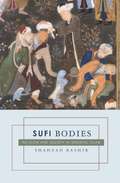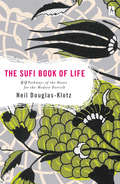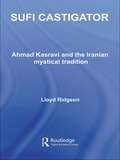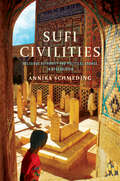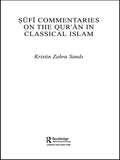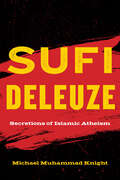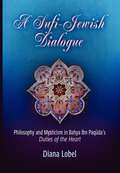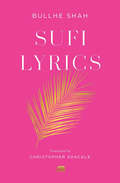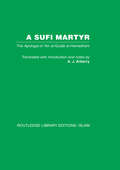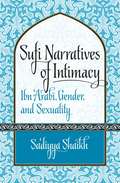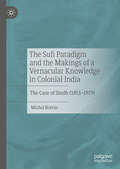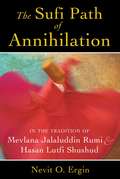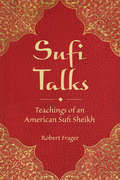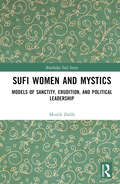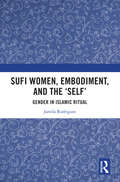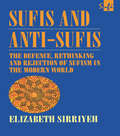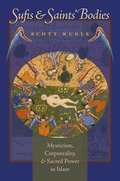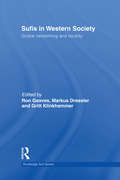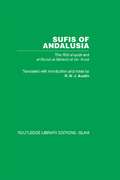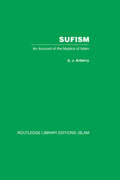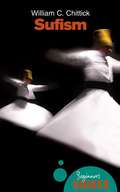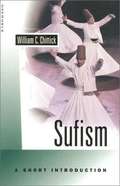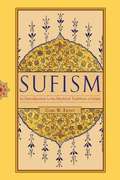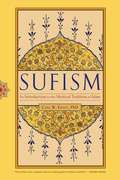- Table View
- List View
Sufi Bodies: Religion and Society in Medieval Islam
by Shahzad BashirBetween 1300 and 1500 C.E. a new form of Sufi Islam took hold among central Islamic peoples, joining individuals through widespread networks resembling today's prominent paths and orders. Understanding contemporary Sufism requires a sophisticated analysis of these formative years. Moving beyond a straight account of leaders and movements, Shahzad Bashir weaves a rich history around the depiction of bodily actions by Sufi masters and disciples, primarily in Sufi literature and Persian miniature paintings of the period.Focusing on the Persianate societies of Iran and Central Asia, Bashir explores medieval Sufis' conception of the human body as the primary shuttle between interior (batin) and exterior (zahir) realities. Drawing on literary, historical, and anthropological approaches to corporeality, he studies representations of Sufi bodies in three personal and communal arenas: religious activity in the form of ritual, asceticism, rules of etiquette, and a universal hierarchy of saints; the deep imprint of Persian poetic paradigms on the articulation of love, desire, and gender; and the reputation of Sufi masters for working miracles, which empowered them in all domains of social activity. Bashir's novel perspective illuminates complex relationships between body and soul, body and gender, body and society, and body and cosmos. It highlights love as an overarching, powerful emotion in the making of Sufi communities and situates the body as a critical concern in Sufi thought and practice. Bashir's work ultimately offers a new methodology for extracting historical information from religious narratives, especially those depicting extraordinary and miraculous events.
The Sufi Book of Life
by Douglas-Klotz NeilPart meditation book, part oracle, and part collection of Sufi lore, poetry, and stories, The Sufi Book of Life offers a fresh interpretation of the fundamental spiritual practice found in all ancient and modern Sufi schools—the meditations on the 99 Qualities of Unity. Unlike most books on Sufism, which are primarily collections of translated Sufi texts, this accessible guide is a handbook that explains how to apply Sufi principles to modern life. With inspirational commentary that connects each quality with contemporary concerns such as love, work, and success, as well as timeless wisdom from Sufi masters, both ancient and modern, such as Rumi, Hafiz, Shabistari, Rabia, Inayat Khan, Indries Shah, Irina Tweedie, Bawa Muhaiyadden, and more, The Sufi Book of Life is a dervish guide to life and love for the twenty-first century. On the web: http://sufibookoflife. com .
Sufi Castigator: Ahmad Kasravi and the Iranian Mystical Tradition (Routledge Sufi Series #Vol. 19)
by Lloyd RidgeonSufi Castigator investigates the writings of Ahmad Kasravi, one of the foremost intellectuals in Iran. It studies his work within the context of Sufism in modern Iran and mystical Persian literature and includes translations of Kasravi’s writings. Kasravi provides a fascinating topic for those with interests in Sufism and Iranian studies as he attempted to produce a form of Iranian identity that he believed was compatible with the modern age and Iranian nationalism. His stress on reason and the de-mystification of religion caused him to repudiate Sufism and much of the Sufi literary heritage as backwards and believed it a reason for the weakness of modern Iran. Kasravi’s historical observations were weak, and his writings indicate that he was working towards pre-determined conclusions. However, his works are of significance because they contributed to a major discussion in the 1930s to 1940s about the ideal image and identity that Iranians should adopt. Despite the academic weaknesses of Kasravi’s works he had a profound effect on the next generation of thinkers. Sufi Castigator is stimulating and meticulously researched book and includes two lengthy translations of Kasravi’s works, Sufism and What does Hafez Say? and will appeal to scholars of middle eastern studies.
Sufi Civilities: Religious Authority and Political Change in Afghanistan
by Annika SchmedingDespite its pervasive reputation as a place of religious extremes and war, Afghanistan has a complex and varied religious landscape where elements from a broad spectrum of religious belief vie for a place in society. It is also one of the birthplaces of a widely practiced variant of Islam: Sufism. Contemporary analysts suggest that Sufism is on the decline due to war and the ideological hardening that results from societies in conflict. However, in Sufi Civilities, Annika Schmeding argues that this is far from a truthful depiction. Members of Sufi communities have worked as resistance fighters, aid workers, business people, actors, professors, and daily workers in creative and ingenious ways to keep and renew their networks of community support. Based on long-term ethnographic field research among multiple Sufi communities in different urban areas of Afghanistan, the book examines navigational strategies employed by Sufi leaders over the past four decades to weather periods of instability and persecution, showing how they adapted to changing conditions in novel ways that crafted Sufism as a force in the civil sphere. This book offers a rare on-the-ground view into how Sufi leaders react to moments of transition within a highly insecure environment, and how humanity shines through the darkness during times of turmoil.
Sufi Commentaries on the Qur'an in Classical Islam (Routledge Studies in the Qur'an)
by Kristin SandsMeeting the ever increasing interest in Islam and Sufism, this book is the first comprehensive study of Sufi Qur’anic commentaries and includes translations of many writings previously unavailable in English. It examines the shared hermeneutical assumptions of Sufi writers and the diversity in style of Sufi commentaries. Some of the assumptions analyzed are: * the Qur’an is a multi-layered and ambiguous text open to endless interpretation * the knowledge of deeper meanings of the Qur’an is attainable by means other than transmitted interpretations and rational thought * the self is dynamic, moving through states and stations which result in different interpretations at different times. The styles of Sufi commentaries are explored, which range from philosophical musings to popular preaching to literary narrative and poetry. Other commentaries from the classical period are also investigated to provide context in understanding Sufi approaches and exegetical styles.
Sufi Deleuze: Secretions of Islamic Atheism
by Michael Muhammad Knight“There is always an atheism to be extracted from a religion,” Deleuze and Guattari write in their final collaboration, What Is Philosophy? Their claim that Christianity “secretes” atheism “more than any other religion,” however, reflects the limits of their archive. Theological projects seeking to engage Deleuze remain embedded within Christian theologies and intellectual histories; whether they embrace, resist, or negotiate with Deleuze’s atheism, the atheism in question remains one extracted from Christian theology, a Christian atheism. In Sufi Deleuze, Michael Muhammad Knight offers an intervention, engaging Deleuzian questions and themes from within Islamic tradition. Even if Deleuze did not think of himself as a theologian, Knight argues, to place Deleuze in conversation with Islam is a project of comparative theology and faces the challenge of any comparative theology: It seemingly demands that complex, internally diverse traditions can speak as coherent, monolithic wholes. To start from such a place would not only defy Islam’s historical multiplicity but also betray Deleuze’s model of the assemblage, which requires attention to not only the organizing and stabilizing tendencies within a structure but also the points at which a structure resists organization, its internal heterogeneity, and unpredictable “lines of flight.”A Deleuzian approach to Islamic theology would first have to affirm that there is no such thing as a universal “Islamic theology” that can speak for all Muslims in all historical settings, but rather a multiplicity of power struggles between major and minor forces that contest each other over authenticity, authority, and the making of “orthodoxy.” The discussions in Sufi Deleuze thus highlight Islam’s extraordinary range of possibilities, not only making use of canonically privileged materials such as the Qur’an and major hadith collections, but also exploring a variety of marginalized resources found throughout Islam that challenge the notion of a singular “mainstream” interpretive tradition. To say it in Deleuze’s vocabulary, Islam is a rhizome.
A Sufi-Jewish Dialogue
by Diana LobelWritten in Judeo-Arabic in eleventh-century Muslim Spain but quickly translated into Hebrew, Bahya Ibn Paquda's Duties of the Heart is a profound guidebook of Jewish spirituality that has enjoyed tremendous popularity and influence to the present day. Readers who know the book primarily in its Hebrew version have likely lost sight of the work's original Arabic context and its immersion in Islamic mystical literature. In A Sufi-Jewish Dialogue, Diana Lobel explores the full extent to which Duties of the Heart marks the flowering of the "Jewish-Arab symbiosis," the interpenetration of Islamic and Jewish civilizations.Lobel reveals Bahya as a maverick who integrates abstract negative theology, devotion to the inner life, and an intimate relationship with a personal God. Bahya emerges from her analysis as a figure so steeped in Islamic traditions that an Arabic reader could easily think he was a Muslim, yet the traditional Jewish seeker has always looked to him as a fountainhead of Jewish devotion. Indeed, Bahya represents a genuine bridge between religious cultures. He brings together, as well, a rationalist, philosophical approach and a strain of Sufi mysticism, paving the way for the integration of philosophy and spirituality in the thought of Moses Maimonides.A Sufi-Jewish Dialogue is the first scholarly book in English about a tremendously influential work of medieval Jewish thought and will be of interest to readers working in comparative literature, philosophy, and religious studies, particularly as reflected in the interplay of the civilizations of the Middle East. Readers will discover an extraordinary time when Jewish, Christian, and Islamic thinkers participated in a common spiritual quest, across traditions and cultural boundaries.
Sufi Lyrics: Selections from a World Classic (Murty Classical Library Of India - Hup Ser. #1)
by Bullhe ShahBullhe Shah’s work is among the glories of Panjabi literature, and the iconic eighteenth-century poet is widely regarded as a master of mystical Sufi poetry. His verses, famous for their vivid style and outspoken denunciation of artificial religious divisions, have long been beloved and continue to win audiences around the world. This striking new translation is the most authoritative and engaging introduction to an enduring South Asian classic.
A Sufi Martyr: The Apologia of 'Ain al-Qudat al-Hamadhani
by A.J. ArberryOriginally published in 1969. This volume was composed by an eminent Sufi mystic whilst in prison in Baghdad, awaiting execution, in a vain attempt to overthrow his sentence; he was put to death in AD 1311 at the age of 33. This apologia is a document of great poignancy, composed in most elegant Arabic and translated with the customary skill and elegance for which A J Arberry became so well-known.
Sufi Narratives of Intimacy
by Sa'Diyya ShaikhThirteenth-century Sufi poet, mystic, and legal scholar Muhyi al-Din ibn al-'Arabi gave deep and sustained attention to gender as integral to questions of human existence and moral personhood. Reading his works through a critical feminist lens, Sa'diyya Shaikh opens fertile spaces in which new and creative encounters with gender justice in Islam can take place. Grounding her work in Islamic epistemology, Shaikh attends to the ways in which Sufi metaphysics and theology might allow for fundamental shifts in Islamic gender ethics and legal formulations, addressing wide-ranging contemporary challenges including questions of women's rights in marriage and divorce, the politics of veiling, and women's leadership of ritual prayer. Shaikh deftly deconstructs traditional binaries between the spiritual and the political, private conceptions of spiritual development and public notions of social justice, and the realms of inner refinement and those of communal virtue. Drawing on the treasured works of Sufism, Shaikh raises a number of critical questions about the nature of selfhood, subjectivity, spirituality, and society to contribute richly to the prospects of Islamic feminism as well as feminist ethics more broadly.
The Sufi Paradigm and the Makings of a Vernacular Knowledge in Colonial India: The Case of Sindh (1851–1929)
by Michel BoivinThis book demonstrates how a local elite built upon colonial knowledge to produce a vernacular knowledge that maintained the older legacy of a pluralistic Sufism. As the British reprinted a Sufi work, Shah Abd al-Latif Bhittai's Shah jo risalo, in an effort to teach British officers Sindhi, the local intelligentsia, particularly driven by a Hindu caste of professional scribes (the Amils), seized on the moment to promote a transformation from traditional and popular Sufism (the tasawuf) to a Sufi culture (Sufiyani saqafat). Using modern tools, such as the printing press, and borrowing European vocabulary and ideology, such as Theosophical Society, the intelligentsia used Sufism as an idiomatic matrix that functioned to incorporate difference and a multitude of devotional traditions—Sufi, non-Sufi, and non-Muslim—into a complex, metaphysical spirituality that transcended the nation-state and filled the intellectual, spiritual, and emotional voids of postmodernity.
The Sufi Path of Annihilation: In the Tradition of Mevlana Jalaluddin Rumi and Hasan Lutfi Shushud
by Nevit O. ErginAn exploration of the profound Sufi practice of Itlak Yolu • Examines the three main facets of this practice: zikr or breathing exercises, fasting, and mental suffering • Shares new Sufi parables, the sayings of Sufi master Hasan Lutfi Shushud, and Rumi’s philosophy on annihilation of the Self • Reveals how once the Self is annihilated higher levels of perception are reached In this exploration of the profound spiritual practice of Itlak Yolu, the Sufi path of annihilation, Nevit Ergin examines the three main facets of this path: zikr or breathing exercises, fasting, and mental suffering. Sharing experiences and discussions with Hasan Lutfi Shushud, renowned Sufi saint and final guide of Gurdjieff’s disciple J. G. Bennett, the author illustrates how suffering--“the searing fire of contrition”--is the most effective instrument of spiritual progress, for it is suffering that burns the Self. He explains how faithful practice of zikr and fasting will bring on this kind of suffering when the student is ready and will make the suffering tolerable. He shows how once the Self is annihilated higher levels of perception take hold and one finds oneself on the path to sainthood and immortality. Interwoven throughout with sayings by Shushud, Sufi parables, and poems by Rumi, Ergin shares the unique Itlak perspective on the major questions of every seeker: the true nature of love and religion, life and death, and other major spiritual questions. The book also includes an essay on annihilation and absence in Rumi’s philosophy and biographical portraits of Hasan Lufti Shushud by other aspirants who met with him.
Sufi Talks
by Robert FragerOnce a woman brought her son to the thirteenth-century Turkish Sufi master Nasruddin complaining that the boy had an uncontrollable sweet tooth. She asked Nasruddin to tell the boy to stop eating sweets. He said to bring him back in four weeks. When they returned he said, "Boy, I order you to stop eating sweets!" The mother asked, "Couldn't you have said that at the beginning? Why make us wait four weeks?" "No, I couldn't have said that even two weeks ago," Nasruddin replied. "Why not?" asked the mother. "Because I love sweets myself. First I had to control my own love for them. Only then could I tell your son to stop eating them."That is, words are empty unless backed by experience, says Robert Frager. People will not change until they hear from those who have lived what they teach. Frager has indeed lived his teaching. Founder of the Institute for Transpersonal Psychology in 1975, in 1976 he became a student of the Sufi master Muzaffer Efendi. Since becoming a sheikh in 1985, he has given many sohbets-a Turkish word for the spiritual conversations Sufi teachers hold to inspire their students. The sohbets he presents here are compiled from his talks over the past decade and represent Sufism as it is now practiced in the United States.Frager believes that the wisdom in such talks flows through the sheikh from his teacher and his teacher's teacher all the way back to the Prophet Mohammad and God; the sheikh is merely a channel for something greater than any individual. Moreover, these talks are not lectures but rather living connections going both ways between heart and heart. Indeed, the warm, personal immediacy to Frager's voice is rarely found. Like the tales of Nasruddin, he teaches through colorful anecdote and metaphors. Sufi practice has two sides, he says: one is to develop our love of God; the other is to become less self-centered. We need both, just as a bird needs both wings to fly."How can I put my knowledge into practice?" is the question we must ask. As the Qur'an states, those who fail to live by their understanding are like donkeys carrying a load of books. The books won't change them. They can carry the holiest books but will still be donkeys.Among the practices Frager teaches are zikr, or remembrance of God through chanting; halvet, or spiritual retreat; and adab, or "right action." Thus do we develop character-or, rather, restore the character we had at birth. "I've never seen a baby with a bad character," he says. "We are all born in a pure state. With hard work and God's blessings we can return to it." Other topics include Obstacles on the Path, Reducing Narcissism, Inner Work, Prayer, Marriage, Generosity, Taking Responsibility, and Waking before We Die.No matter what one's religion, the reader will find such universal wisdom in this book that he will agree with Frager's teacher Muzaffer Efendi who once advised, "You can tell these stories ten thousand times and people will still benefit from them"
Sufi Talks
by Robert FragerOnce a woman brought her son to the thirteenth-century Turkish Sufi master Nasruddin complaining that the boy had an uncontrollable sweet tooth. She asked Nasruddin to tell the boy to stop eating sweets. He said to bring him back in four weeks. When they returned he said, "Boy, I order you to stop eating sweets!" The mother asked, "Couldn't you have said that at the beginning? Why make us wait four weeks?" "No, I couldn't have said that even two weeks ago," Nasruddin replied. "Why not?" asked the mother. "Because I love sweets myself. First I had to control my own love for them. Only then could I tell your son to stop eating them."That is, words are empty unless backed by experience, says Robert Frager. People will not change until they hear from those who have lived what they teach. Frager has indeed lived his teaching. Founder of the Institute for Transpersonal Psychology in 1975, in 1976 he became a student of the Sufi master Muzaffer Efendi. Since becoming a sheikh in 1985, he has given many sohbets-a Turkish word for the spiritual conversations Sufi teachers hold to inspire their students. The sohbets he presents here are compiled from his talks over the past decade and represent Sufism as it is now practiced in the United States.Frager believes that the wisdom in such talks flows through the sheikh from his teacher and his teacher's teacher all the way back to the Prophet Mohammad and God; the sheikh is merely a channel for something greater than any individual. Moreover, these talks are not lectures but rather living connections going both ways between heart and heart. Indeed, the warm, personal immediacy to Frager's voice is rarely found. Like the tales of Nasruddin, he teaches through colorful anecdote and metaphors. Sufi practice has two sides, he says: one is to develop our love of God; the other is to become less self-centered. We need both, just as a bird needs both wings to fly. "How can I put my knowledge into practice?" is the question we must ask. As the Qur'an states, those who fail to live by their understanding are like donkeys carrying a load of books. The books won't change them. They can carry the holiest books but will still be donkeys.Among the practices Frager teaches are zikr, or remembrance of God through chanting; halvet, or spiritual retreat; and adab, or "right action." Thus do we develop character-or, rather, restore the character we had at birth. "I've never seen a baby with a bad character," he says. "We are all born in a pure state. With hard work and God's blessings we can return to it." Other topics include Obstacles on the Path, Reducing Narcissism, Inner Work, Prayer, Marriage, Generosity, Taking Responsibility, and Waking before We Die.No matter what one's religion, the reader will find such universal wisdom in this book that he will agree with Frager's teacher Muzaffer Efendi who once advised, "You can tell these stories ten thousand times and people will still benefit from them."
Sufi Women and Mystics: Models of Sanctity, Erudition, and Political Leadership (Routledge Sufi Series)
by Minlib DallhThis book focuses on women’s important contribution to Sufism by analysing the lives and seminal contributions of six mystic Sufi women to Islamic spirituality. To help reverse the sidelining of Sufi women in the recorded academic literature, the author has selected a representative sample of figures from diverse Islamic dynasties with varying backgrounds, social status, and devotional contributions. Taking a historical approach attentive to specific political contexts, readers will be introduced to the contributions of Umm Ali al-Balkhi and Fātima of Nishāpūr in the ninth-century Khurāsān, Aisha al-Mannūbiyya of the Hafsid dynasty in Afriqya, Aisha al-Bā‘únīyya of the Mamlūk dynasties of Egypt and Syria, the Mughal princess Jahan Ara Begum, and the daughter of the Caliph of Sokoto, Nana Asma’u. It is argued that these ascetic and Sufi women were recognized by their male and female peers, became political leaders in their communities, and were honored as examples of sanctity and erudition. Their works influenced mystical discourse, hagiographical writings, religious language and models of religious authority to secure legacies of Islamic orthopraxis. The book will appeal to anyone interested in Sufism and Sufi history, as well as to those wishing to delve into the understudied topic of Muslim women’s spirituality.
Sufi Women, Embodiment, and the ‘Self’: Gender in Islamic Ritual
by Jamila RodriguesThis book is an ethnographic case study of Sufi ritual practice and embodied experience amongst female members of the Naqshbandi community. Drawing on fieldwork in Cape Town, South Africa, and Lefke, Cyprus (2013/2014), the author examines women’s experiences within a particular performance of Sufi tradition. The focus is on the ritual named hadra, involving the recital of sacred texts, music, and body movement, where the goal is for the individual to reach a state of intimacy with God. The volume considers Sufi practice as a form of embodied cultural behavior, religious identity, and selfhood construction. It explains how Muslim women’s participation in hadra ritual life reflects religious and cultural ideas about the body, the body’s movement, and embodied selfhood expression within the ritual experience. Sufi Women, Ritual Embodiment and the ‘Self’ engages with studies in Sufism, symbolic anthropology, ethnography, dance, and somatic studies. Contributing to discussions of religion, gender, and the body, the book will be of interest to scholars from anthropology, sociology, religious ritual studies, Sufism and gender studies, and performance studies.
Sufis and Anti-Sufis: The Defence, Rethinking and Rejection of Sufism in the Modern World (Routledge Sufi Series)
by Elizabeth SirriyehDespite its continuing appeal in the Muslim world, Sufism has faced fierce challenges in the last 250 years. This volume assesses the evolution of anti-Sufism since the middle of the eighteenth century and Sufi strategies for survival. It also considers the efforts of a few significant Muslim intellectuals to contemplate a future for a mystical approach to Islam without traditional Sufism. Many studies of Islam in the modern period have focused on the attempts of Muslim 'modernists' or 'fundamentalists' to come to terms with western modernity, and Sufis have often been marginalised in the process. Elizabeth Sirriyeh redresses this neglect by assigning to Sufism a central place in the broader history of Islam in the modern world and by examining how changing understandings of Sufism's role in modern conditions have affected Muslims of all shades of opinion.
Sufis and Saints' Bodies
by Scott KugleIslam is often described as abstract, ascetic, and uniquely disengaged from the human body. Scott Kugle refutes this assertion in the first full study of Islamic mysticism as it relates to the human body. Examining Sufi conceptions of the body in religious writings from the late fifteenth through the nineteenth century, Kugle demonstrates that literature from this era often treated saints' physical bodies as sites of sacred power.Sufis and Saints' Bodies focuses on six important saints from Sufi communities in North Africa and South Asia. Kugle singles out a specific part of the body to which each saint is frequently associated in religious literature. The saints' bodies, Kugle argues, are treated as symbolic resources for generating religious meaning, communal solidarity, and the experience of sacred power. In each chapter, Kugle also features a particular theoretical problem, drawing methodologically from religious studies, anthropology, studies of gender and sexuality, theology, feminism, and philosophy. Bringing a new perspective to Islamic studies, Kugle shows how an important Islamic tradition integrated myriad understandings of the body in its nurturing role in the material, social, and spiritual realms.
Sufis in Western Society: Global networking and locality (Routledge Sufi Series)
by Ron Geaves Markus Dressler Gritt KlinkhammerIn recent years Sufism has undergone something of a revival as a spiritual alternative to other manifestations of Islam. This book investigates the development of Sufism in Western societies, with a regional focus on North America and Europe. Exploring a number of issues relating to the dynamic tensions between religious globalization processes and specific sacred localities, this book looks at the formation of Sufi movements that have migrated from their place of origin to become global religious networks. Sufi groups are highly differentiated and often inaccessible, so the origins and development of Sufism in the West have not been widely studied. Employing a comparative approach based on regional fieldwork and case studies, this book addresses theoretical issues and gives a comprehensive analysis of distinct communities and the development of regional branches of Sufi orders, providing an international perspective on Sufism in the West. With contributions from well-known international experts on the topic, the book addresses Sufi orders in the context of the transnational networks in which they are operating and the constraints of the localities in which they live. This book will be of interest to scholars and students of religion, Islam and Sufism in particular.
Sufis of Andalucia: The Ruh al-Quds and Al-Durat Fakhirah (Routledge Library Editions: Islam)
by M. Ibn 'ArabiSufis of Andalusia consists of biographical sketches of some of the contemplatives and spiritual masters among whom Ibn 'Arabi spent his early years.
Sufism: An Account of the Mystics of Islam
by A.J. ArberryOriginally published in 1950.Thinkers such as Ghazali and Ibn `Arabi, poets such as Ibn al-Farid, Rumi, Hafiz and Jami were greatly inspired by the lives and sayings of the early Sufis. This book was the first short history of Sufism to be published in any language, illustrating the development of its doctrines with numerous quotations from literature.
Sufism: A Beginner's Guide (Beginner's Guides #1)
by William C. ChittickWilliam C. Chittick, the leading scholar in the field, offers a compelling insight into the origins, context, and key themes of this fascinating movement. After a general overview of the tradition, he draws upon the words of some of the greatest Sufi writers - among them Ibn Arabi, Baha Walad and Rumi himself - to give a fresh and revealing perspective on the teachings and beliefs of Sufism and its proponents. Covering everything from the history and growth of Sufism to its place in the modern world, this sympathetic book will be appreciated by anyone interested in Sufism, from complete beginners to students, scholars and experts alike.
Sufism: A Short Introduction
by William C. ChittickThe Sufi tradition, commonly associated with the Whirling Dervishes and beautiful poetry of the great mystic Rumi, is introduced here in this new guide. William C. Chittick, the leading scholar in this field, offers a compelling insight into the origins, context, and key themes of this movement. After a general overview of the tradition, he draws upon the words of some of the greatest Sufi writers to give a fresh and revealing perspective on the teaching and beliefs of Sufism and its proponents.
Sufism: An Introduction to the Mystical Tradition of Islam
by Carl W. ErnstThe Sufis are as diverse as the countries in which they've flourished--from Morocco to India to China--and as varied as their distinctive forms of art, music, poetry, and dance. They are said to represent the mystical heart of Islam, yet the term Sufism is notoriously difficult to define, as it means different things to different people both within and outside the tradition. With that fact in mind, Carl Ernst explores the broadest range of Sufi philosophies and practices to provide one of the most complete and comprehensive introductions to Sufism available in English. He traces the history of the movement from the earliest days of Islam to the present day, along the way examining its relationship to the larger world of Islam and its encounters with both fundamentalism and secularism in the modern world.
Sufism: An Introduction to the Mystical Tradition of Islam (Routledge Sufi Ser. #No.4)
by Carl W. ErnstThe Sufis are as diverse as the countries in which they've flourished—from Morocco to India to China—and as varied as their distinctive forms of art, music, poetry, and dance. They are said to represent the mystical heart of Islam, yet the term Sufism is notoriously difficult to define, as it means different things to different people both within and outside the tradition. With that fact in mind, Carl Ernst explores the broadest range of Sufi philosophies and practices to provide one of the most complete and comprehensive introductions to Sufism available in English. He traces the history of the movement from the earliest days of Islam to the present day, along the way examining its relationship to the larger world of Islam and its encounters with both fundamentalism and secularism in the modern world.
